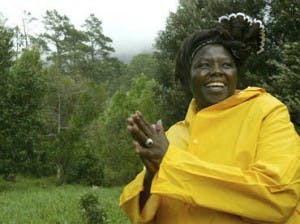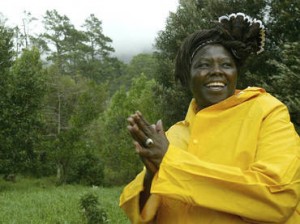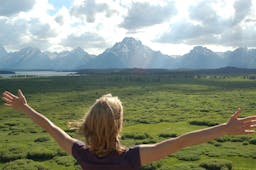Calling All Hummingbirds
Apr 28, 2022
Story


I have lost count of how many times I have listened to Professor Wangari Maathai tell the story of the hummingbird and its valiant effort to save the burning forest. The wholeness in her tone and the purity of her spirit move me each time. Professor Maathai was a true force for goodness, larger than life with her radiant vigor and resolute fearlessness. With her gone, it feels as if there is a vast emptiness. It is an unexpected space that I suspect she would want us to use as an opening.
I came to know Professor Maathai’s greatness through research on her leadership. She embodied something I call restorative leadership, which she and Wanjira helped define. Restorative leadership embraces the interconnectedness of life and acts for the highest benefit to all. It is doing our best to do no harm and to heal the earth, our communities, and ourselves, believing as Wangari did: “One can improve one’s life and circumstances—and the earth itself.” As our questions arise after her passing, we can look to her leadership for guidance on this journey toward global wellbeing.
Understand and teach interconnection
Professor Maathai dedicated herself to helping us see the environment in a holistic way that illuminated our rights and responsibilities as global citizens and community members. She had a gift for making the interconnections in life keenly clear: “If you destroy the forest then the river will stop flowing, the rains will become irregular, the crops will fail and you will die of hunger and starvation.”
As a Nobel Laureate, she was the first prize recipient to be recognized for drawing connections between environmental and societal wellbeing. With that, she believed “The Norwegian Nobel Committee has challenged the world to broaden the understanding of peace: there can be no peace without equitable development; and there can be no development without sustainable management of the environment in a democratic and peaceful space…. The choice is ours.”
As we choose with our daily actions and inactions, let us carry Wangari’s work forward by helping others to “make connections between their own personal actions and the problems they witness in the environment and in society.”
Take responsibility and take action
Wanjira explains how the Green Belt Movement so effectively educates and empowers: “We have a very interesting metaphor we use in teaching that is called the ‘Wrong Bus Syndrome.’ If you get on the wrong bus and head in the wrong direction, what do you do? Then we reflect that on our own realities: You are saying that your environment is devastated. What happened? How do we turn this bus around?”
“What’s going on in the environment is not God. It’s not fate. It is actually something that we are doing that is causing it.” Wanjira’s message is the same as her mother’s: once we see the connections and our role, we do not have to wait for anyone else to take action. We just need to participate. Professor Maathai would prod us all as participants asking: “Where do you think these problems come from?…. You also play a part…. You may not be able to do much about the government, but you can do something about what is in your power. That is what produced the tree planting campaign.”
Now that Wangari is gone, she would want us to create new campaigns relevant to our own communities as we realize that we are on the wrong bus and need to take it in the direction of a sustainable and just world.
Be patient and persistent
Above all else, Professor Maathai wanted us to “realize [our] hidden potential and [be] empowered to overcome inertia and take action.” She wanted us to recognize that we are “the primary custodians and beneficiaries of the environment that sustains [us]” and do the work of lasting change. It is a deliberate process that requires great patience and persistence, continuously balancing a long-term vision with short-term progress. It requires embracing the means of heightening consciousness as an end itself in the process.
Calling all hummingbirds
Life and death are a complete cycle. With the generational shift, those that remain discover the Hopi wisdom: “We are the ones we have been waiting for.” We are each other’s heroines and heroes as we answer the call to live our leadership into an extraordinary vision for what is possible.
Professor Maathai embodied a restorative commitment, standing up in the current to create eddies of empowered space for others to reclaim their wisdom and to reconnect with each other and the earth. Let us honor her legacy by doing “what all of us should do,” as she said—the best that we can as a legion of hummingbirds ensuring that life on earth flourishes. We are the ones to douse the flames of global problems by starting with ourselves in our own communities, and by remembering that we cannot continue to be short-sighted by living as if future generations of humans and other species do not also have a right to life on earth.




